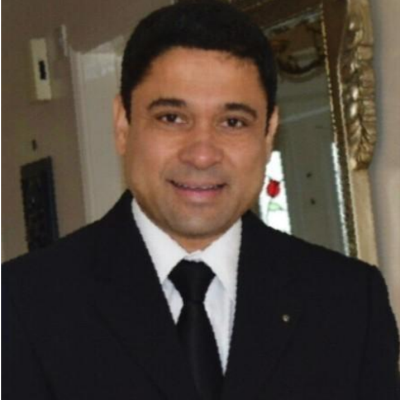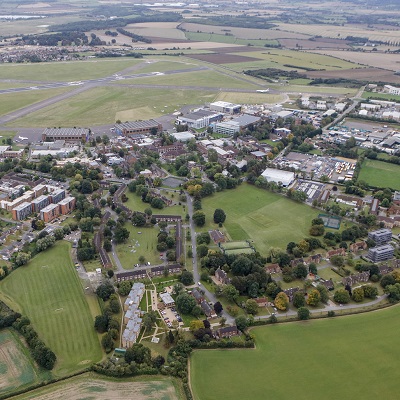Overview
- Start date1 December 2025
- DurationMSc: three years part-time; Postgraduate Diploma: two years part-time; Postgraduate Certificate: one year part-time
- DeliveryTaught modules | Individual research project | Group project
- QualificationMSc, PgDip, PgCert
- Study typePart-time
- CampusOnline
Why this course?
This programme is delivered by the Cranfield Safety and Accident Investigation Centre, a global leader in aviation safety and investigation for nearly five decades. This course stands out for its unique collaboration between the Centre’s academic experts and senior staff from the UK Civil Aviation Authority International (CAAi). This partnership ensures a perfect blend of academic rigour with real-world regulatory insight.
The course structure is designed to support deep and sustained learning. Delivered entirely online, it offers flexibility for part-time students, whether in the UK or overseas, who need to balance study with professional and personal commitments. Cranfield University provides comprehensive digital library and IT services to support remote learners throughout their studies.
The programme is:
- Practice-oriented – The course includes two group projects (one for PGCert), delivered in the second half of each academic year. These provide valuable collaborative experience, while MSc students also undertake an individual research project to further develop their analytical and investigative skills.
- Unique – Developed in close partnership with CAA International, the course benefits from contributions by senior regulatory professionals alongside Cranfield’s academic staff.
- Flexible – The programme’s clearly structured, part-time format combines live online teaching with pre-recorded materials, enabling students to manage their study time around other commitments with confidence.
Informed by Industry
Cranfield University has developed this unique course in close collaboration with CAA International, the technical advisory arm of the UK Civil Aviation Authority (CAA). The UK CAA is recognised globally for its leadership in adopting risk-based approaches to regulation, focusing efforts where the risks are greatest.
Since the course was first launched, it has become well established, with its structure and content continuously shaped by feedback from students and their employers. This ongoing engagement ensures the programme remains relevant to the evolving needs of the aviation industry and regulatory community.
Course details
The part-time MSc is designed to be completed over three years and comprises seven modules: four taught modules (Modules 1–4), two group project modules (Group Projects 1 and 2), and an individual research project.
The Postgraduate Diploma (PgDip) is typically completed over two years and includes six modules: the four taught modules and both group projects.
The Postgraduate Certificate (PgCert) is expected to be completed in one year and requires successful completion of three core modules: Modules 1 and 2, and Group Project 1.
Course delivery
Taught modules | Individual research project | Group project
Group project
The structure of the course strongly promotes group work, with projects in both of the first two years. This provides an invaluable experience for the students not only on the MSc route but also on PgDip and PgCert exit routes. All students will experience working on group projects to develop their communication, team work and project management skills. This is one of the reasons that make this MSc course appealing to a wide audience.
- Group project 1 – Managing Current Safety Issues (compulsory - year 1)
- Group project 2 – Managing Emerging Safety Issues (compulsory - year 2)
Individual project
- Thesis project (compulsory - year 3)
Modules
Keeping our courses up-to-date and current requires constant innovation and change. The modules we offer reflect the needs of business and industry and the research interests of our staff and, as a result, may change or be withdrawn due to research developments, legislation changes or for a variety of other reasons. Changes may also be designed to improve the student learning experience or to respond to feedback from students, external examiners, accreditation bodies and industrial advisory panels.
To give you a taster, we have listed the compulsory and elective (where applicable) modules which are currently affiliated with this course. All modules are indicative only, and may be subject to change for your year of entry.
Course modules
Compulsory modules
All the modules in the following list need to be taken as part of this course.
Advanced Safety and Risk Management
| Aim |
Most aviation organisations already operate safety management systems (SMS), but their effectiveness can vary significantly. This module takes a critical and in-depth look at the effectiveness of SMS in practice. It explores key elements such as safety assurance methods, organisational safety culture, and the concept of resilience in complex systems. The module also examines a range of risk assessment approaches, encouraging students to evaluate their strengths, limitations, and suitability in different operational contexts. |
|---|---|
| Syllabus |
• Methods to determine level of safety risk. • Sharing of intelligence and learning to create improved safety knowledge. • Links between security, cyber risk and effective safety management of an organisation. • Just culture, organisational culture and links to safety culture for both industry and regulator. • Difference between operator and NAA rules with regards to SMS. • Turning data into knowledge. • Safety information and analyses, including reporting systems and investigation. • Evaluation of safety performance. • Risk Analysis: Identification and Assessment. |
| Intended learning outcomes |
On successful completion of this module, you will be able to: 1. Analyse and interpret risk in the aviation industry. 2. Create methods for the continuous improvement of managing safety. 3. Assess and implement techniques for the identification and management of hazards and risks. 4. Evaluate and apply appropriate methods of safety management for diverse situations, including the strengths and weaknesses of each one. 5. Examine the issues to be faced for emerging safety risks and the risk analysis of new systems. |
Aviation Legislation and Regulatory Approach
| Aim |
This module explores the global framework established by the International Civil Aviation Organization (ICAO) to support the safe and sustainable growth of the aviation industry. It examines the evolving shift from compliance-based to performance- and risk-based regulation, as adopted by leading authorities such as the UK CAA and Transport Canada. Students will evaluate the challenges faced by ICAO and national aviation authorities in developing effective regulations, delivering oversight, and assuring safety. The module also critically reviews the differences between compliance-based and performance-based approaches, and their implications for State Safety Programmes (SSPs) and Safety Management Systems (SMS). |
|---|---|
| Syllabus |
• Chicago Convention, ICAO framework, Standards and Recommended Practices (Annexes 1-19) and Guidance material provided by ICAO including how they are produced. The structure and role of ICAO and how it operates. • ICAO Member States’ responsibilities, States Safety Programmes and State Safety Oversight (SSO) System Critical Elements (CE). National Aviation Authorities, their role and organisation structures. Characteristics of an effective and mature regulator: oversight styles and effectiveness for safety assurance. • European Legal Framework, EU’s institutions, European Aviation Safety Agency (EASA) and its relationship with ICAO and member states’ regulatory authorities. Rulemaking processes, Hard Law and Soft Law concept. • Reasons for regulatory oversight, and how to determine the correct / most appropriate level to achieve effective risk management. Difference between compliance and performance / risk-based approaches. • Performance-based regulation - Roles and Responsibilities. Safety Risk Policy and Regulatory SMS Governance within an NAA. • Global, European and UK case studies on regulatory frameworks and oversight approaches. Industry standards such as IOSA, ISAGO, and IS-BAO and their role in the overall regulatory and surveillance system. • Clarification of responsibilities between multiple regulatory agencies within an ICAO state. Case study of MoU between UK CAA and UK HSE. • Safety Management Systems for Service Providers, demonstrating compliance with the regulatory requirements, governance of SMS in different organisations including different sectors operated, business model, size, complexity etc. and the responsibilities of the Accountable Manager. • Application of ‘risk-based oversight’ to internal auditing programmes and oversight of all outsourced functions. |
| Intended learning outcomes |
On successful completion of this module, you will be able to: 1. Critically examine the origin and scope of the ICAO Standards and Recommended Practices, particularly Annex 19 "Safety Management" and national/regional laws and regulations. 2. Appraise the fundamental characteristics of "compliance-based oversight" and "performance/risk-based oversight". 3. Design the necessary processes for implementing performance / risk-based oversight system within regulatory authorities and service providers. 4. Evaluate how service providers can demonstrate compliance with the regulatory requirements for implementing SMS and provide safety assurance to all internal and external stakeholders, including regulators, business partners and customers. |
Responding to Risk in Sociotechnical Systems
| Aim |
Fourth module of course with start in January of the second year with a value of 20 credits which equals to approximately 200 hours. Compulsory for the following qualifications: MSc and PgDip. Taught part is conducted via live-streamed online classes in January, February and March. Assessment is due in May. Aviation is a human-in-the loop system. Humans are represented at all levels of the organisation from leadership to the operator on the front line. Resilience emerges through interaction across this complex socio-technical system. This demands consideration of many organisations involved in the operation including, for example regulators, operators and manufacturers. Capturing the required high organisational performance is key to maintaining and improving high levels of safety in an evolving system. This module considers aviation from both organisational and individual perspectives. Models, tools and techniques are examined to capture, appraise and mitigate risks that emerge due to the interactive complexity of the system. |
|---|---|
| Syllabus |
• Models of the organisation and managing organisational change. • Individual and organisational learning. • Human performance shaping factors. • Human error assessment and mitigation. • Relevant research methods for the study of sociotechnical systems. |
| Intended learning outcomes |
On successful completion of this module, you will be able to: 1. Develop systems thinking to interpret how safety is construed in socio-technical systems. 2. Apply tools and techniques to characterise and mitigate socio-technical risk throughout the organisation. 3. Evaluate the influence of change and system evolution on safety. 4. Appraise methods for monitoring and evaluating safety interventions. |
Aircraft Accident Investigation and Response
| Aim |
Fifth module of course with start in late April or very early May of the second year with a value of 10 credits which equals to approximately 100 hours. Compulsory for the following qualifications: MSc and PgDip. Taught part is conducted via a one week live-streamed online classes in late April or very early May. Assessment is due in July. This course is based around a case study approach to aircraft accident investigation. You will have the opportunity to experience important elements of aircraft accident investigation from initial notification of an event through to generating and communicating investigative findings. You will be presented with a simulated accident scenario during which you will be exposed to all elements of the investigation such as evidence collection, interviewing, analysis and the generation of safety recommendations. |
|---|---|
| Syllabus |
• Accident investigation approaches and response. • On-site appraisal and preservation of evidence. • Human factors in investigations. • Witnesses and interviewing. • Preparing and managing recommendations. • Communication of investigation findings. |
| Intended learning outcomes |
On successful completion of this module you should be able to:
|
Managing Current Safety Issues - Group Project
| Aim |
Third module of year 1 with a value of 10 credits which equals to approximately 100 hours. Compulsory for the following qualifications: MSc, PgDip and PgCert. Taught part is conducted via live-streamed online classes in September, October, November and December. Assessment is due in December. Analysis of current existing hazards is fundamental for understanding of the associated risks and develop effective mitigation strategies. Regulatory authorities and service providers in the industry can benefit from the independent studies as limited resources prevent them from being able to carry out such analyses for all the identified risks themselves. This is an opportunity for students to work independently and as a member of a team to assess an existing safety issue already identified by a service provider (e.g. operator, aerodrome, design / production organisation, maintenance organisation, air navigation service provider) or a regulatory authority (e.g. CAA, EASA). The assessment of the associated risks and development of mitigation strategies is undertaken as a group project. The aim of the module is to synthesise elements of the first two modules and give students the opportunity to consolidate their knowledge and apply the skills they gained by conducting a group project. |
|---|---|
| Syllabus |
The subject matter range will be dependent upon the specific nature of the project. This could be based on a current topic from the aviation industry or from a project set specifically for the Group. The proposed existing complex safety issue can be obtained from the organisation of a student / participant (e.g. a complex issue in the risk register of the organisation). Alternatively, an issue that appears in the CAA / EASA Safety Risk Portfolio / Register (not yet analysed and assessed), can be chosen by students to focus on for their group project. Either way, the output of their project should be beneficial to the organisations involved, which may have provided data for analysis. |
| Intended learning outcomes |
On successful completion of this module you should be able to:
|
Managing Emerging Safety Issues - Group Project
| Aim |
Sixth module of course with start in June of the second year with a value of 30 credits which equals to approximately 300 hours. Compulsory for the following qualifications: MSc and PgDip. Taught part is conducted via live-streamed online classes in June, July, September, October, November and December. Assessment is due in December. Analysis of emerging hazards is fundamental for in-depth understanding of the associated risks and develop effective mitigation strategies. Regulatory authorities and service providers in the industry can benefit from the independent studies as limited resources prevent them from being able to carry out such analyses themselves. This is an opportunity for students to work independently and as a member of a team to analyse an emerging complex safety issue; the latter may already have been identified by a service provider / regulatory authority or be based on a new topic from independent research. The assessment of associated risks and development of mitigation strategies is undertaken as a group project. The aim of the module is to synthesise elements of all four taught modules and give students the opportunity to consolidate their knowledge and apply the skills - in particular from the module Responding to Risk in Sociotechnical systems. |
|---|---|
| Syllabus |
The subject matter range will be dependent upon the specific nature of the project. The proposed emerging complex safety issue can be obtained from the organisation of a student / participant (e.g. a complex issue in the risk register of the organisation). Alternatively, an issue that currently appears in the CAA / EASA Safety Risk Portfolio / Register or other source which has not yet been analysed and assessed, can be chosen. Either way, the output of the project should be beneficial to the organisations involved, which may have provided data for analysis. One of the fundamental differences between MCSI and MESI is that MESI will focus on the additional aspects such as the impact of emerging risks on the other stakeholders outside of the industry such as travelling public and public overflown, political institutions, media etc. Examples of such a project could be the introduction of commercial drone operations for carrying goods, introduction of autonomous urban air mobility VTOL systems, impact of introducing disruptive technologies such as blockchain on commercial air transport systems. |
| Intended learning outcomes |
On successful completion of this module you should be able to:
|
Individual Research Project - MSc Thesis
| Aim |
Last, seventh module of course with start in December of the second year with a value of 60 credits which equals to approximately 600 hours. Compulsory for the following qualifications: MSc. Assessment is due in very late September or very early October of the third year of this course. The award of a Masters’ degree resulting from a taught programme of study requires the student to submit a thesis based on a structured programme of research. This structured programme can be delivered through collaboration with an industrial sponsor; although it may be driven by research interests of the Faculty's academics. |
|---|---|
| Syllabus |
The subject matter range will be dependent upon the specific nature of the project. The thesis should satisfactorily set out the results of the structured programme and demonstrate the candidate’s ability to conduct original investigations, to test ideas (whether the candidate’s own or those of others) and to obtain appropriate conclusions from the work. In most cases, the results of the research programme should be set in the context of related work previously published by others. The student is required to communicate their findings in a written thesis and through an oral presentation based around a poster. |
| Intended learning outcomes |
On successful completion of this module you should be able to:
|
Teaching team
Your career
Most students on this course are already in full-time employment, often in roles within the aviation or regulatory sectors. This MSc is designed to support career progression by preparing professionals for greater levels of responsibility and leadership.
The programme’s unique blend of topics across safety management, risk, and regulation equips graduates with versatile skills applicable across all areas of aviation, and even beyond the sector. Whether aiming for promotion, a transition into a new role, or increased responsibility within their current organisation, students benefit from a qualification that is both academically rigorous and highly relevant to industry practice.
How to apply
Click on the ‘Apply now’ button below to start your online application.
See our Application guide for information on our application process and entry requirements.
The regulation of aviation safety has evolved significantly from just compliance checking. The implementation of safety management systems in industry and the practice of risk-based surveillance in the regulator, pioneered in the UK, have fundamentally changed the regulatory landscape. Never has it been more important for regulators and industry across the world to have a common understanding of how these tools can drive improved safety performance. We have chosen to work with Cranfield University in designing this course because of their exclusive focus on aviation and postgraduate education; access to a working airfield, with virtual control tower and aircraft, make this a unique place to learn.
I am really enjoying the course content, and this is exactly what I was hoping for when I joined the ASMRR MSc. The assignment questions after each module are well-thought-out in my view, as they drive me towards a much better understanding of the module content, ensuring a high retention about the subject in my mind. As I am progressing through the second year of the MSc, I find that the knowledge gained is not only helping me significantly in my job role but also in enhancing my profile within easyJet.
From a university perspective, I find the research work that Cranfield does, especially in the field of aviation very exciting. As a student, I find the support system and flexibility that Cranfield provides extremely helpful.
Aviation seems set for accelerated adoption of new technologies and new ways of doing business globally. In such a world, those who can best apply safety management and performance-based practices will be particularly well-placed to make a difference. With its focus on regulation, its use of group working and its engagement of current practitioners, this programme is a unique personal development opportunity designed to prepare aviation professionals for that world. I am so excited about this programme’s potential!
.ashx?la=en&hash=00FE7BEF09169367AB9151D33A3B14FE95EA6278)








